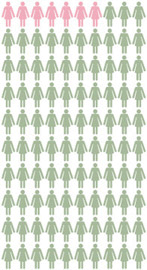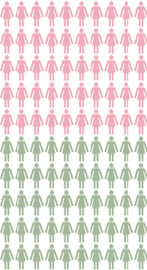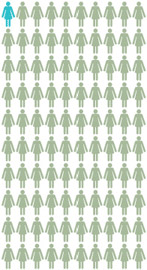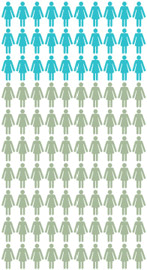Does Breast or Ovarian Cancer Run in Your Family?

If you have close relatives with breast or ovarian cancer, you may be at higher risk for developing these diseases. Does your family health history put you at higher risk? Would you benefit from cancer genetic counseling and testing?
Each year, over 200,000 women in the United States are diagnosed with breast cancer and more than 20,000 are diagnosed with ovarian cancer. About 3% of breast cancers (about 6,000 women per year) and 10% of ovarian cancers (about 2,000 women per year) result from inherited mutations (changes) in the BRCA1 and BRCA2 genes that are passed on in families. Inherited mutations in other genes can also cause breast and ovarian cancer, but BRCA1 and BRCA2 are the genes most commonly affected. Although breast cancer is much more common in women, men with BRCA1 or BRCA2 mutations are more likely to get breast cancer than other men. BRCA mutations also increase the likelihood of getting pancreatic cancer and, in men, high grade prostate cancer. Knowing your family health history can help you find out if you could be more likely to develop breast, ovarian, and other cancers. If so, you can take steps to prevent cancer or to detect it earlier when it may be more treatable.
Cancer risks for women
|
|
|---|---|
| Women who inherit a mutation in the BRCA1 or BRCA2 gene have a much higher risk of developing breast and ovarian cancer. But, important steps can be taken to help lower the risk for cancer in these women. It’s important to know that not everyone who inherits a BRCA1 or BRCA2 mutation will get breast or ovarian cancer, and that not all inherited forms of breast or ovarian cancer are due to mutations in BRCA1 and BRCA2. | |
Breast Cancer Risk |
|

|

|
|
Women in the U.S. General Population  About 7 out of 100 women in the U.S. general population will get breast cancer by age 70. About 93 out of 100 of these women will NOT get breast cancer by age 70. |
Women with a BRCA1 or BRCA2 Mutation  About 50 out of 100 women with a BRCA1 or BRCA2 mutation will get breast cancer by age 70. About 50 out of 100 of these women will NOT get breast cancer by age 70. |
Ovarian Cancer Risk |
|

|

|
|
Women in the U.S. General Population  About 1 out of 100 women in the U.S. general population will get ovarian cancer by age 70. About 99 out of 100 of these women will NOT get ovarian cancer by age 70. |
Women with a BRCA1 or BRCA2 Mutation  About 30 out of 100 women with a BRCA1 or BRCA2 mutation will get ovarian cancer by age 70. About 70 out of 100 of these women will NOT get ovarian cancer by age 70. |
Does Your Family Health History Put You At Risk?
Collect your family health history of breast, ovarian, and other cancers and share this information with your doctor. You can inherit BRCA and other mutations from your mother or your father, so be sure to include information from both sides of your family. Include your close relatives: parents, sisters, brothers, children, grandparents, aunts, uncles, nieces, nephews, and grandchildren. If you have had breast, ovarian, or other cancers, make sure that your family members know about your diagnosis.
Tell your doctor if you have a personal or family health history of any of the following:
- Breast cancer, especially at a younger age (age 50 or younger)
- Triple negative breast cancer at age 60 or younger in women (Triple negative cancers are a type of breast cancer that lack estrogen receptors, progesterone receptors and human epidermal growth factor receptor 2.)
- Cancer in both breasts
- Breast cancer in a male relative
- Ovarian, fallopian tube, or primary peritoneal cancer
- Pancreatic cancer or high grade prostate cancer
- Breast, ovarian, pancreatic, or high grade prostate cancer among multiple blood relatives
- Ashkenazi (Eastern European) Jewish ancestry
- A known BRCA mutation in the family
You can use the Know:BRCA tool to collect your family health history information, assess your risk for BRCA mutations, and share this information with your doctor. Update your family health history on a regular basis and let your doctor know if any new cases of breast or ovarian cancer occur.
What Can You Do If You Are Concerned About Your Risk?
If your doctor decides that your family health history makes you more likely to get breast, ovarian, and other cancers, he or she may refer you for genetic counseling. Even if your doctor doesn’t recommend genetic testing and counseling, your family health history of breast cancer can affect when you start mammography screening. If you are a woman with a parent, sibling, or child with breast cancer, you are at higher risk for breast cancer. Based on current recommendations, you should consider talking to your doctor about starting mammography screening in your 40s.
The genetic counselor can use your family health history information to determine your possible cancer risks and whether you might consider BRCA genetic testing to find out if you have a BRCA1 or BRCA2 mutation. Genetic testing is most useful if first performed on someone in your family who has had breast or ovarian cancer. If this relative has a BRCA1 or BRCA2 mutation, then her close relatives can be offered testing for that mutation. If she does not have a BRCA1 or BRCA2 mutation, then her relatives may not need to be tested. Remember that most breast and ovarian cancer is not caused by BRCA mutations so most women don’t need BRCA genetic testing.
The genetic counselor can discuss the pros and cons of testing and what possible test results could mean for you and your family. It is important to note that genetic testing for BRCA mutations will not find all causes of hereditary breast or ovarian cancer. In some cases, the genetic counselor might recommend genetic testing using a panel that looks for mutations in several genes in addition to BRCA1 and BRCA2. BRCA genetic counseling and testing is often, but not always, covered without cost sharing by many health plans under the Affordable Care Act.
More Information
More Information
- Page last reviewed: October 18, 2017
- Page last updated: October 18, 2017
- Content source:
- Office of Public Health Genomics
- Page maintained by: Office of the Associate Director for Communication, Digital Media Branch, Division of Public Affairs




 ShareCompartir
ShareCompartir
